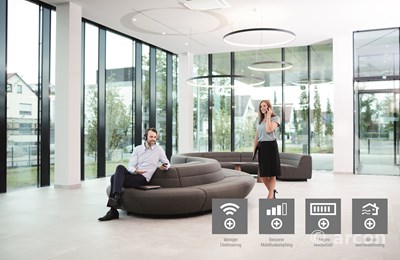arconnect – Better reception, lesser electrosmog
RF transparency for thermal insulating glass

Optimized reception of broadband data | Easy to retrofit | Maintenance-free and durable | Can meet all thermal insulation and low-energy requirements
Modern thermal insulation glazing attenuates cellular frequencies to such an extent that in many indoor spaces, the reception of data and telephone calls is often only possible to a very limited extent. The glass refiner arcon has joined forces with the Fraunhofer Institute to develop a coating that enables transmission of all common cellular frequencies, including the new 5G standard, thereby also reducing electrosmog and the energy consumption of smartphones and tablets.
Over 60 million people in Germany will have used at least one smartphone by the end of 2020. There is no doubt that mobile devices are influencing how we all live together at every level. So much so that many people experience increased restlessness when their tablets, smartphones, and the like are unable to receive data or make telephone calls. It's not always the cellular dead zones that interfere with the reception. Modern thermal insulation glazing also acts like a Faraday cage and blocks a large part of the mobile-radio signals. Sometimes it is not possible to even receive phone calls indoors—let alone use apps or Internet applications—unless there is access to a WLAN.
And yet such glazing and façades are now a necessary component of the statutorily prescribed thermal insulation concepts in office buildings or public institutions. In homes, too, insulating glass with precious metal coatings has long been ensuring reduced heating costs and—associated with this— reduced consumption of resources. In collaboration with the Fraunhofer Institute for Solar Energy Systems (ISE) in Freiburg, arcon, one of Europe's leading glass refiners based in Feuchtwangen, Germany, has developed an innovative coating that enables good mobile-radio signal reception inside buildings: the arconnect. In an innovative refining process, the thermal insulating glass gets a fine, almost invisible structure. This structure makes the glass permeable to all common cellular frequencies, including the new 5G standard. "Even at the higher frequencies of the 5G standard, the coating enables optimum reception of data signals, allowing real-time applications," says Hermann Dehner, Product Manager at arcon. This property of the glass was particularly important to the developers, because the fifth generation of mobile communications will not just enable faster and more reliable mobile Internet. Its high transmission rates are also the basic prerequisite for applications such as the automation of production processes in industry and business, new smart home applications or entertainment based on virtual reality.
Tests have shown that arconnect increases the transmission value of double-glazing insulating glass by a factor of 1000 compared with the conventional thermal insulation glazing. If modern triple glazing is used, the transmission improves even more by a factor of 10,000.
Besides, the thermal insulation properties of the insulating glass are also retained almost completely with arconnect. "All low-energy requirements for thermal insulation glazing can be easily met without a problem. The Ug value changes only minimally," Dehner emphasizes. The structure also does not reduce the strength. The coating is durable and maintenance-free. In addition, existing window installations can also be retrofitted without a problem.
Another great advantage of arconnect: the technology helps in reducing electrosmog inside the buildings. Since a mobile device always tries to maintain the signal reception, it increases its output power when the quality of the connection is poor—like behind the conventional thermal insulation glazing of a building. As a result, the device owner is exposed to stronger electromagnetic fields, that is: electrosmog. However, arconnect guarantees high transmission values. So smartphones and tablets need to ramp up their power to a significantly lesser degree in order to receive data. The reduction in output power also conserves battery power, which helps extend the running time of the mobile device.
arcon supplies arconnect as laminated safety glass (LSG) as well as float glass. Processing companies receive the basic glass, which they can easily fabricate as per their customer requirements.
Back to overview
